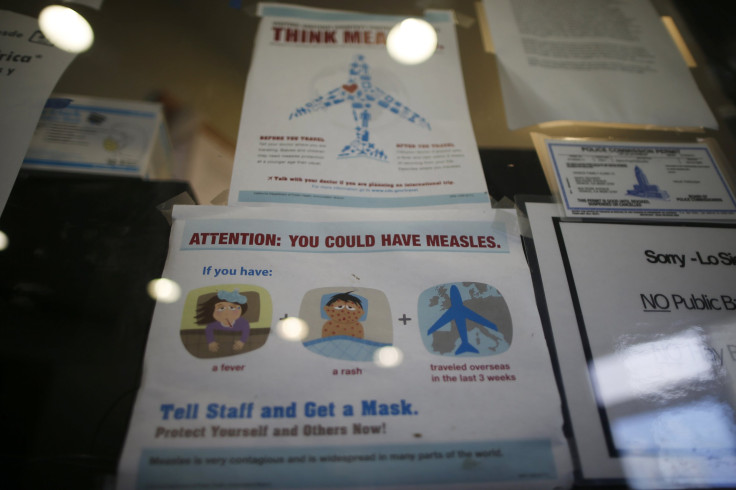Measles Outbreak In Ohio: Health Officials Warn Of Possible Exposure At Dollar Tree Store
KEY POINTS
- Officials said an infected person visited a Dollar Tree store on Dec. 1
- A measles outbreak in central Ohio has so far sickened dozens of people
- All cases are in the unvaccinated people
Health authorities have confirmed a measles infection in a person who had visited a Dollar Tree store in Columbus, Ohio. This comes amid a measles outbreak in central Ohio that has so far sickened dozens of people.
Columbus Public Health (CPH) said the person visited the 5990 Westerville Rd Dollar Tree store on Dec. 1, sometime between "6:20 and 8:50 PM."
"Any unvaccinated individual at the above location, during that time, should watch for symptoms of measles & call their health care provider if sick," the agency tweeted.
CPH is investigating a confirmed case of measles that visited the Dollar Tree at 5990 Westerville Rd. on 12/1/22 from 6:20-8:50PM.
— Columbus Health (@ColumbusHealth) December 3, 2022
Any unvaccinated individual at the above location, during that time, should watch for symptoms of measles & call their health care provider if sick.
The CPH has been keeping an eye on an ongoing measles outbreak in central Ohio that, as of Dec. 2, has affected 50 people since it began in November. Among the patients, 20 had to be hospitalized.
All cases occurred among "unvaccinated children." Most of the affected were 1- to 2-year-olds (26), followed by 3- to 5-year-olds (10), while nine cases were reported in very young children less than a year old. The remaining five cases were reported in kids six to 15 years old.
Infants and young children were considered to be at a "high risk" for severe illness and complications from measles infection, according to the U.S. Centers for Disease Control and Prevention (CDC).
The agency had previously warned about three other measles exposure sites in the state – Meijer, 6175 Sawmill Road on Nov. 19; Jesus Power Assembly of God on Nov. 20 and the Macy's and JCPenney stores inside Polaris Mall on Nov. 25.
Unvaccinated people who visited these areas were asked to monitor their health for possible symptoms and notify their healthcare provider before visiting the doctor's office.
- Meijer, 6175 Sawmill Rd. - Sat, 11/19/22, 5:30-8:30PM
— Columbus Health (@ColumbusHealth) November 30, 2022
- Jesus Power Assembly of God, 5215 Cleveland Ave. - Sun, 11/20/22, 10AM-2:30PM
- Polaris Mall – Macy’s & JCPenney stores, 1500 Polaris Parkway - Fri, 11/25/22, 6:30-10:30PM (Didn't visit food court or children’s play area.)
Measles is "one of the most contagious of all infectious diseases," according to the CDC. It is so contagious that up to nine out of 10 susceptible people who come in close contact with a measles patient will actually develop an illness.
"Measles virus can remain infectious in the air for up to two hours after an infected person leaves an area," the agency noted.
Humans are said to be the "only natural hosts" of the measles virus, according to the CDC. Although the disease was declared to be "eliminated" in the U.S., outbreaks still occur in the country. Furthermore, measles cases in the U.S. have varied, from as low as 13 in 2020 and 37 in 2004 to as high as more than 1,200 cases in 2019. The 2019 case count is said to be the "greatest number of cases reported in the U.S. since 1992."
As of Dec. 1, there have been a total of 76 measles cases in five jurisdictions. Most of the cases are in unvaccinated people.
"Measles can be prevented with measles-containing vaccine, which is primarily administered as the combination measles-mumps-rubella (MMR) vaccine," noted the CDC. "One dose of MMR vaccine is approximately 93% effective at preventing measles; two doses are approximately 97% effective."

© Copyright IBTimes 2025. All rights reserved.






















